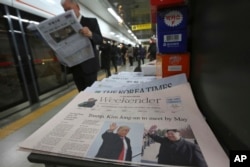South Koreans are increasingly optimistic about the prospects for peace following U.S. President Donald Trump’s surprising decision to meet with North Korean leader Kim Jong Un to resolve the nuclear standoff on the Korean Peninsula.
“No one likes war, not North Korea, here, or surrounding countries as well. So I think it will go (progress) toward peace,” said Seoul resident Jang Soon-ae on Tuesday.
More than 70 percent of respondents to a recent South Korean public opinion poll were in favor of the expected summits between Kim and South Korean President Moon Jae-in in April, and then in May between Kim and Trump.
In November of 2017, North Korea suspended what had been a two-year period of intense nuclear and ballistic missile tests that was focused on developing an intercontinental ballistic missile to target the U.S. mainland. In January the Kim government pivoted to a more cooperative posture by agreeing to participate in the Pyeongchang Olympics in the South.
Doubts about North
During the Olympics, the North Korean leader extended an invitation for an inter-Korean summit to Moon, and more recently expressed a willingness to meet with Trump.
Planning for the nuclear summits are underway even though North Korea has not yet confirmed its participation. The degree to which North Korea will actually go to dismantle its nuclear program in order to end harsh U.S.-led sanctions remain a key issue to be resolved.
While hopeful on one hand, more than 60 percent of South Korean respondents in the poll were also skeptical North Korea would abide by the terms of a denuclearization deal.
“I think we cannot trust 100 percent of what North Koreans say on denuclearization as they are so good at lying,” said Seoul resident Han Pil-Woo.
North Korea had agreed to deals in the past to end its nuclear weapons program in return for economic assistance, while covertly continuing development efforts and eventually reneging on its pledges.
Trump over Xi
President Trump for the first time gained a higher favorability rating than Chinese President Xi Jinping in a South Korean survey, after he agreed to meet with Kim without preconditions. At the same time, the Trump administration emphasized that its “maximum pressure” campaign would remain in place until a nuclear deal is reached.
Under Trump the United States has led international efforts to pressure Pyongyang to halt its nuclear program by imposing tough sanctions that ban billions of dollars worth of North Korean coal, iron ore, clothing products and seafood exports. The Trump administration has also said that, if necessary, it is prepared to use military force to eliminate the nuclear threat.
Moon rising
In another South Korean poll, President Moon Jae-in's approval rating increased to more than 70 percent in response to his pro-active diplomatic efforts to facilitate denuclearization talks.
“I do not know what the outcome will be, but I think that the attempt itself is meaningful,” said Seoul resident Song Ja-young.
Military drills
Also on Tuesday, the United States and South Korea announced that joint military drills would begin on April 1. The annual combined exercises, which this year will involve more than 23,000 U.S. troops and 300,000 South Korean forces, was postponed to maintain a peaceful atmosphere during the winter Olympics.
The Pentagon has emphasized the defensive nature of this year’s exercises.
Pyongyang in the past had threatened to respond to the joint military drills in some provocative way. But the North Korean leader dropped his opposition to the exercises during a recent meeting with a South Korean diplomatic delegation.
Lee Yoon-jee in Seoul contributed to this report.









